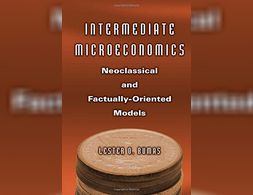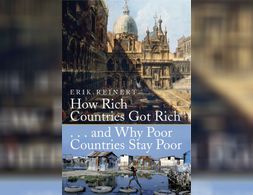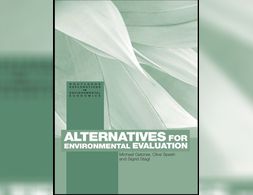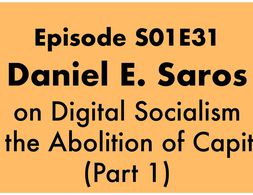✕
119 results
New Tools of Economic Dynamics gives an introduction and overview of recently developed methods and tools, most of them developed outside economics, to deal with the qualitative analysis of economic dynamics. It reports the results of a three-year research project by a European and Latin American network on the intersection of economics with mathematical, statistical, and computational methods and techniques.
In 18th century Europe figures such as Adam Smith, David Ricardo, Friedrich List and Jean Baptiste Colbert developed theories regarding international trade, which either embraced free trade seeing it as a positive sum game or recommended more cautious and strategic approaches to trade seeing it as a potential danger and a rivalry and often as a zero-sum game. What about today?
How did the rich countries really become rich? In this provocative study, Ha-Joon Chang examines the great pressure on developing countries from the developed world to adopt certain 'good policies' and 'good institutions', seen today as necessary for economic development.
Stiglitz answers the question why globalization and world trade has not delivered on its promise of increased well being as much as classical economists thought, by pointing to the power asymmetries: firstly, between industrialized nations and developing nations and secondly, between special corporate interest and social interests. In his analysis, developed countries and MNCs were able to extract the benefits, while shifting the costs (i.e. pollution) to states and communities with lesser power. Amongst many other historical examples the pharmaceutical and the mining industry are discussed to some length.
Ha Joon Chang exposes the main ideas of his book Bad Samaritans, namely that historically states have developed and industrialized by making policy interventions related to industry protection, tariffs and subsidies and not by opening their markets to free trade. Chang elaborates on the examples of Japan, the US, Singapore and Germany amongst others to show that an interventionist path to development has been the regularity and not an anomaly. In the end of the lecture, he argues that they idea of a level playing field should be replaced by a trade order that accounts for differences in power and economic capacities of different countries. The last 20 minutes are questions and answers.
This essay suggests to bring together two aspects of economic thought which so far have developed largely separately: degrowth and feminist economics. In this strive, the concept of care work and its role in feminist economics will be introduced and the downsides of the commodification of care work will be discussed. Subsequently, contributions to the discussion on the (re)valuation of care work will be taken into account.
This Blog Post describes the U.S. federal reserve money system from the perspective of the Modern Monetary Theory (MMT). Therefore it presents a theory of money creation, gives simple examples how this influences the economy and the historical process of why the monetary system of the US has developed this way.
Michael Kalecki famously remarked “I have found out what economics is; it is the science of confusing stocks with flows”. Stock-Flow Consistent (SFC) models were developed precisely to address this kind of confusion. The basic intuition of SFC models is that the economy is built up as a set of intersecting balance sheets, where transactions between entities are called flows and the value of the assets/liabilities they hold are called stocks. Wages are a flow; bank deposits are a stock, and confusing the two directly is a category error. In this edition of the pluralist showcase I will first describe the logic of SFC models – which is worth exploring in depth – before discussing empirical calibration and applications of the models. Warning that there is a little more maths in this post than usual (i.e. some), but you should be able to skip those parts and still easily get the picture.
An analysis of the modern neoliberal world, its characteristics, flaws and planetary boundaries aiming to end new economic politics and support a global redistribution of power, wealth and roles.
In this online lecture, economist and Professor at the School of Oriental and African Studies (SOAS), London, UK. Costas Lapavitsas, explains the limitations of the neoliberal market in creating financial stability and growth in both, developing and developed countries.
Global Value Chains (GVCs) started to play an increasing and key role in the global economy from the 1990s on. The market mechanism in GVCs supports industrialisation in the Global South and under certain conditions product and process upgrading. But GVCs do not lead to the catching-up of countries in the sense of them approaching real GDP per capita levels comparable with developed countries. These arguments are supported by a critical interpretation of the traditional trade theory, the New Trade Theory and specific approaches to explain GVCs, especially different governance structures and power relationships. Several case studies support these arguments. For catching-up, countries need comprehensive horizontal and vertical industrial policy and policies for social coherence. The small number of countries which managed to catch up did this in different variations.
This course introduces students to political economy and the history of economic thought. We will cover the core ideas in various schools of economic thought, positioning them in the historical and institutional context in which they were developed. In particular, we will cover some economic ideas from the ancient world and the middle ages; the enlightenment; the emergence of and main ideas in classical political economy (Adam Smith, David Ricardo, Thomas Malthus, and others); Marx, Mill, and Keynes; European versus American economic thought through history; the rise of mathematical economics; economic theories around state-managed economies versus socialism; Austrian economics; behavioral economics; and the future of economics.
This is the first intermediate microeconomics textbook to offer both a theoretical and real-world grounding in the subject. Relying on simple algebraic equations, and developed over years of classroom testing, it covers factually oriented models in addition to the neoclassical paradigm, and goes beyond theoretical analysis to consider practical realities.
In this refreshingly revisionist history, Erik Reinert shows how rich countries developed through a combination of government intervention, protectionism, and strategic investment, rather than through free trade.
A systematic comparison of the three major economic theories, showing how they differ and why these differences matter in shaping economic theory and practice.
Contending Economic Theories offers a unique comparative treatment of the three main theories in economics as it is taught today: neoclassical, Keynesian, and Marxian. Each is developed and discussed in its own chapter, yet also differentiated from and compared to the other two theories.
Environmental cost-benefit analysis was developed by economists in the belief that monetary valuation of the environmental repercussions of economic activity is essential if the "environment " stands any chance of being included in government and business decisions.
An overview of the last century economic theories asking what makes a heterodox economist. This lecture focuses on the evolution of the various academic traditions in economics. Lavoie presents his own typology for categorising seminal work within the post-Keynesian tradition while leaving space to acknowledge that categories are not binary, but can be used to help understand the different traditions, and how they have developed over the last decades.
While many are unsatisfied with capitalism and critique it in highly sophisticated ways, there are few concrete proposals for a socialist mode of production that could replace the capitalist one. Daniel E. Saros has developed such a proposal in his book "Information Technology and Socialist Construction – The End of Capital and the Transition to Socialism" which we discuss at length over the course of two episodes.
Marxian Political Economy focuses on the exploitation of labour by capital. The economy is not conceived as consisting of neutral transactions for exchange and cooperation, but instead as having developed historically out of asymmetric distributions of power, ideology and social conflicts.
A central question in development economics literature is, “Why do countries stay poor?” The key disagreements are whether the lack of economic growth stems from institutions or from geography (Nunn 2009). From an institutional perspective, hostile tariff regimes and commodity price dependencies form a barrier to a sectoral shift that would otherwise lead to economic development in developing countries (Blink and Dorton 2011) (Stiglitz 2006).[i]
This article reviews insights of existing literature on global care chains. A specific focus is laid on the impact that the refugee crisis has on global care chains and in turn how the crisis impacts the de-skilling of the women in the migrant workforce.
By conducting a discourse analysis (SKAD) in the field of academic economics textbooks, this paper aims at reconstructing frames and identity options offered to undergraduate students relating to the questions ‘Why study economics?’ and ‘Who do I become by studying economics?’. The analysis showed three major frames and respective identity offerings, all of which are contextualized theoretically, with prominent reference to the Foucauldian reflection of the science of Political Economy. Surprisingly, none of them encourages the student to think critically, as could have been expected in a pedagogical context. Taken together, economics textbooks appear as a “total structure of actions brought to bear upon possible action” (Foucault), therefore, as a genuine example of Foucauldian power structures.
Austrian economics focuses on the economic coordination of individuals in a market economy. Austrian economics emphasises individualism, subjectivism, laissez-faire politics, uncertainty and the role of the entrepreneur, amongst others.
The novel coronavirus (Covid-19) is rapidly spreading around the world. The real economy is simultaneously hit by a supply shock and a demand shock by the spread of coronavirus. Such a twin shock is a rare phenomenon in recent economic history.
An essay of the writing workshop on Nigeria’s Readiness for and the Effect of the Fourth Industrial Revolution
The concept of financialisation has undergone a similar career as ‘globalisation’, ‘neoliberalism’ or even ‘capitalism’, in the course of which it changed from the explanandum to the explanans; the process of financialisation is taken for granted, while the concrete historical and empirical causal conditions of its realisation and perpetuation are being moved into the background.
Institutional economics focuses on the role of social institutions in terms of laws or contracts, but also those of social norms and patterns of human behaviour that are connected to the social organisation of production, distribution and consumption in the economy.
Approaching the law of nature that determines all forms of economy. The bulk of economic theory addresses the economic process by setting out on a catalogue of aspects, seeking the laws in the aspects and hoping to get together a reliable view of the whole.
The article pursues the two related questions of how economists pretend to know and why they want to know at all. It is argued that both the economic form of knowledge and the motivation of knowing have undergone a fundamental change during the course of the 20th century. The knowledge of important contemporary economic textbooks has little in common with an objective, decidedly scientifically motivated knowledge. Rather, their contents and forms follow a productive end, aiming at the subjectivity of their readers.
Behavioural economics deals with observing behaviour and economic decision making behaviour.
Neoclassical economics focuses on the allocation of scarce resources. Economic analysis is mainly concerned with determining the efficient allocation of resources in order to increase welfare.
Feminist economics focuses on the interdependencies of gender relations and the economy. Care work and the partly non-market mediated reproduction sphere are particularly emphasised by feminist economics.
As seen with the United Nations significant promotion of the Sustainable Development Goals (SDGs) in the past few years, the issue of global development is of growing concern to many international organizations. As humanity continues to become more interconnected through globalization, the inequalities and injustices experienced by inhabitants of impacted countries becomes increasingly clear. While this issue can be observed in the papers of different types (e.g., different schools of thought) of economists throughout the world, the work of behavioral and complexity economists offer a unique, collaborative perspective on how to frame decisions for individuals in a way that can positively reverberate throughout society and throughout time.
We use cookies on our website. Click on Accept to help us to make Exploring Economics constantly better!































